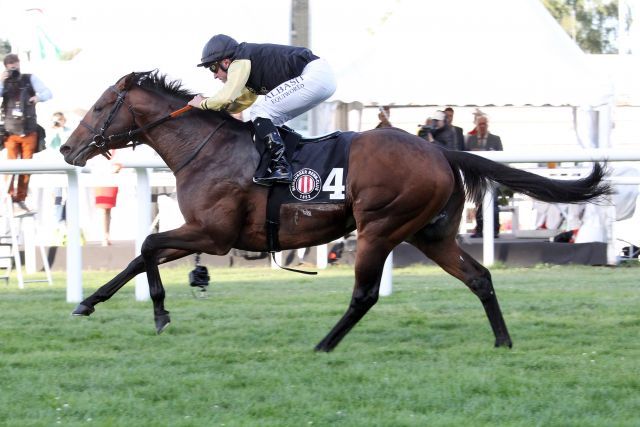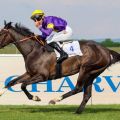Folgen
@turftimes folgen
Drucken
Redaktion
Startseite
Verwandte Artikel:
16.05.24
Mit einer Überraschung endeten die tschechischen 2000 Guineas – Conseq Velká jarní cena (1600 m, ca. 22.300 Euro) am vergangenen Sonntag in Prag. Eigentlich war alles für einen weiteren klassischen Sieg der dieses Jahr so dominanten Ingrid... weiterlesen »
15.05.24
Over the past weekends although we had racing in Germany, they were really very ordinary, run of the mill meetings. Not much to write home about. Probably one of the more significant happenings was the lost of, in my opinion, one of the... weiterlesen »
09.05.24
Vier klassische Rennen in drei verschiedenen Ländern machen aus dem ersten Mai-Wochenende im osteuropäischen Rennsport eine ganz besondere Angelegenheit. Den Anfang machten die als Jarní cena klisen ausgetragenen Tschechischen 1000 Guineas... weiterlesen »
02.05.24
Last Sundays double header, Berlin-Hoppegarten in the morning and Krefeld in the afternoon produced some good racing. Starting in Berlin, where racing got underway at 11 o’clock, they ran an eight-race programme with the Listed Altano-... weiterlesen »
25.04.24
Eine Woche nachdem sie das Vorbereitungsrennen für die tschechischen 1000 Guineas gewann, holte sich die Trainerin Ingrid Janácková Koplíková auch das zweite klassische Trial. Und wieder einmal ließen die Schützlinge der Trainerin aus Lysá... weiterlesen »
25.04.24
One month into the turf season now and German racing standards were raised another notch with the two Group races in Cologne. Again in NRW area where Cologne is situated the rains came and the track rode heavy which some horses found... weiterlesen »
18.04.24
Die erste klassische Siegerin der Saison in der osteuropäischen Region heißt Reshiram (Gleneagles). Die von Pál Csontos trainierte Stute des ambitionierten Stalles Jazy Team holte sich am vergangenen Sonntag die ungarischen 1000 Guineas -... weiterlesen »
18.04.24
Last weekends racing in Dusseldorf featured Germanys first Group race of the year. The Frühjahrs-Meile (1mile) for 4-year-olds and upwards attracted a strong field of twelve including two from France, Gamestop (Lope de Vega) from... weiterlesen »
11.04.24
This was one of the weekends when I thought I would not have much to write about. But surprise, surprise even with moderate racing at Mannheim, a small German country track and then an average card in Mulheim an der Ruhr, there was just... weiterlesen »
11.04.24
Es ist wieder so weit. Das erste April-Wochenende macht traditionsgemäß den Anfang der neuen Saison in der ehemaligen Tschechoslowakei, im Budapester Kincsem Park wird bereits seit Ostern galoppiert. Im Großen und Ganzen kann man mit dem... weiterlesen »
Block: Sidebar Square
Google AdSense 250x250
Google AdSense 250x250
Termine
Sat.
18.05.
18.05.
Sun.
19.05.
19.05.
Mon.
20.05.
20.05.
Mon.
20.05.
20.05.
11:30 Uhr - Renntag
Hannover - 2. Renntag
Großer Preis der Hannoverschen Volksbank, LR | Großer Preis von meravis, LR
Hannover - 2. Renntag
Großer Preis der Hannoverschen Volksbank, LR | Großer Preis von meravis, LR
Sat.
25.05.
25.05.
Sun.
26.05.
26.05.
Thu.
30.05.
30.05.
Fri.
31.05.
31.05.
Sat.
01.06.
01.06.
Sun.
02.06.
02.06.
Sat.
08.06.
08.06.
Sun.
09.06.
09.06.
Sun.
09.06.
09.06.
Sun.
09.06.
09.06.
Sat.
15.06.
15.06.
Sun.
16.06.
16.06.
Sun.
16.06.
16.06.
Thu.
20.06.
20.06.
Sat.
22.06.
22.06.
Sun.
23.06.
23.06.
Mon.
24.06.
24.06.
Sat.
29.06.
29.06.
Sun.
30.06.
30.06.
Wed.
03.07.
03.07.
Thu.
04.07.
04.07.
Sat.
06.07.
06.07.
Sun.
07.07.
07.07.
10:30 Uhr - Renntag
Hamburg - 5. Renntag
Idee 155. Deutsches Derby, Gr. I | BBAG Meiler-Auktionsrennen, Kat. C | BBAG Steher Auktionsrennen, Kat. C
Hamburg - 5. Renntag
Idee 155. Deutsches Derby, Gr. I | BBAG Meiler-Auktionsrennen, Kat. C | BBAG Steher Auktionsrennen, Kat. C
Sat.
13.07.
13.07.
Sun.
14.07.
14.07.
Sun.
14.07.
14.07.
Sat.
20.07.
20.07.
Sun.
21.07.
21.07.
Sun.
21.07.
21.07.
Thu.
25.07.
25.07.
Sun.
28.07.
28.07.
Sun.
28.07.
28.07.
Sun.
28.07.
28.07.
Sat.
03.08.
03.08.
Sun.
04.08.
04.08.
13:00 Uhr - Renntag
Düsseldorf - 6. Renntag
166. Henkel-Preis der Diana - German Oaks, Gr. I | Fritz Henkel-Preis | BBAG Auktionsrennen, Kat. C
Düsseldorf - 6. Renntag
166. Henkel-Preis der Diana - German Oaks, Gr. I | Fritz Henkel-Preis | BBAG Auktionsrennen, Kat. C
Sun.
04.08.
04.08.
Sat.
10.08.
10.08.
Sun.
11.08.
11.08.
Fri.
16.08.
16.08.
Sat.
17.08.
17.08.
Sun.
18.08.
18.08.
Sun.
18.08.
18.08.
Sat.
24.08.
24.08.
Sat.
24.08.
24.08.
Sun.
25.08.
25.08.
Block: Adsense 728 x 90
Google AdSense 728x90
Google AdSense 728x90
Impressum - Datenschutzerklärung - Kontakt
©2010-2013 Dequia Media in Kooperation mit Turf-Times















